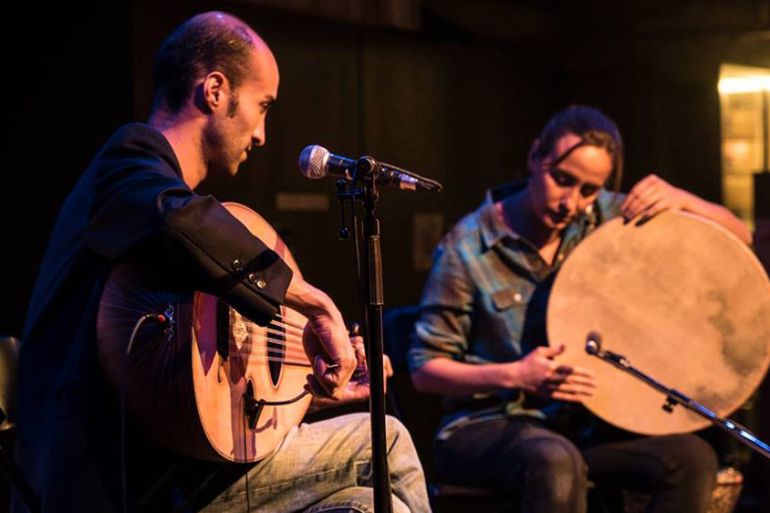Exploring the Arab world’s challenges through film
Two recent festivals granted valuable exposure to Arab film-makers, delving into issues of migration, exile and gender.

London – Hsan, a penniless 50-year-old in Tunisia, agrees to paint his house purple to honour the country’s president in exchange for a job.
But his plan goes awry when the Tunisian revolution in 2011 topples the regime.
Keep reading
list of 4 items‘Accepted in both [worlds]’: Indonesia’s Chinese Muslims prepare for Eid
Photos: Mexico, US, Canada mesmerised by rare total solar eclipse
What is a Godzilla anyway? The 70-year-old monster behind the movies
Shot in six days on a budget of $45,000, the fictional 30-minute film, The Purple House, is equal parts comedy and drama – a reflection of the madness that its director, Selim Gribaa, lived through during the Arab Spring in Tunisia.
“I needed humour to make fun of politicians before and after the revolution,” Gribaa told Al Jazeera. “At the same time, there is unemployment and suffering in people. This tone is summed up well in the soundtrack, where one finds joy and sadness at the same time.”
READ MORE: Newfound cinematic freedom tested in Tunisia
Gribaa’s film won the audience award at the Green Caravan Film Festival last month in Paddington, London. The environmentally themed festival showcased a number of highly charged films that also touched on human rights and social issues by directors from countries not commonly known for critical film-making – including Iran, Kuwait and Bahrain.
![Green Caravan cofounder Reham Alsamerai, pictured at right, collects votes for the audience award [Reham Alsamerai/Al Jazeera]](/wp-content/uploads/2015/12/33681439043244599438b19a922c83a0_18.jpeg)
“[The film-makers] are miracle workers,” said Green Caravan’s cofounder, Reham Alsamerai, who launched the project in 2009 with fellow Kuwaiti Sandra Alsaleh. “In many of these countries, there is nearly no support and no infrastructure in place for the production of films, and yet these young, innovative, relentless film-makers manage to get their films made and their stories told.
“We believe film holds the power to open and to change minds,” Alsamerai added. “It can raise debate without antagonising, and, much like music, it can bring people of all stripes into the same room to feel something together.”
READ MORE: Palestinian film nominated for Oscar
Meanwhile, in nearby West London, the BBC Arabic Festival recently screened 20 films at its headquarters, exploring topics that included migration, exile, gender and sexuality in formats ranging from one-minute shorts to full feature films.
Now in its second year, the festival was hosted by Eddie Izzard, who spoke about growing up in Yemen, before screening the investigative documentary Pregnant and in Chains by Christine Garabedian, which focuses on foreign workers in the United Arab Emirates who are sentenced to prison for the crime of pre-marital sex.
In the film’s most haunting scene, a Filipina shop clerk is seen serving jail time while accompanied by her two small children in a communal cell. She complains of not having enough money for milk and diapers, and of losing contact with her boyfriend, who had promised marriage.
The short film Sisa, Iron Lady, directed by Aly Elsotohy, won the festival’s reportage award. It tells the story of an elderly Egyptian woman whose husband died while she was pregnant, spurring her to disguise herself as a man to support her child away from gender bias.
Forty-three years later, her incredible story was finally told. “I consider Sisa’s story the most important story I have ever worked on,” said Elsotohy, a former investigative reporter in Egypt. “For me it was very inspiring.”
The unveiling of Sisa’s secret – which was long only known within her immediate family – earned her plaudits in Egypt, including a Badge of Perfection award from President Abdel-Fattah el-Sisi.
READ MORE: Refugee crisis highlighted in Africa film festival
Meanwhile, Jumana Saadeh’s Second Hand Refugee chronicles the story of a Palestinian family displaced to Jordan in 1948, only to have their citizenships revoked in the wake of the Black September conflict of 1970. Without identity documents, the family settled in a refugee camp in Syria. Forty-five years later, they have been uprooted once again.
“It’s 2015, and there are still people in the world that live with no passports or identification papers,” Saadeh told Al Jazeera.
“Imagine what power these people would have if they were just recognised citizens.”
BBC Arabic Festival director Sheyma Buali had glowing praise for Saadeh, calling her “a promising and aspiring documentary film-maker”.
“For the past five years we have seen unprecedented changes that are now flowing beyond our region,” Buali said. “The need to tell and hear these stories has become more urgent as we all funnel into a new reality of globally shared politics.”

Some films offered a bit of humour while tackling the region’s issues. Cairo Drive by Sherief Elkatsha generated some laughts while chronicling the situation of being stuck in a traffic jam in Egypt. Filmed over four years from the perspective of Egyptians locked inside honking vehicles, the film was a microcosm of the paralysis that faces the most populous country in the Middle East.
“I wanted to make a film about Cairo, trying to let the city be the main character,” said Elkatsha, who left Egypt for Brooklyn 20 years ago.
“It seems that driving was the perfect window for looking at the city; [it’s] a universal problem for most Egyptians. The reaction to the film has been fantastic. I think it has been eye-opening for a lot of Western audiences, in that they haven’t often seen that side of Egyptians.”